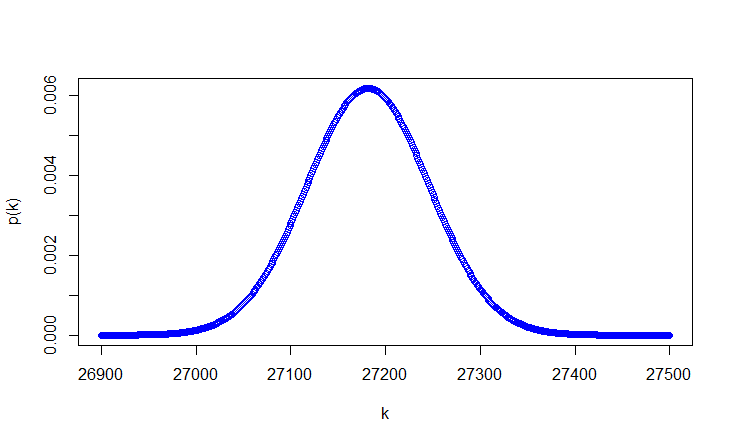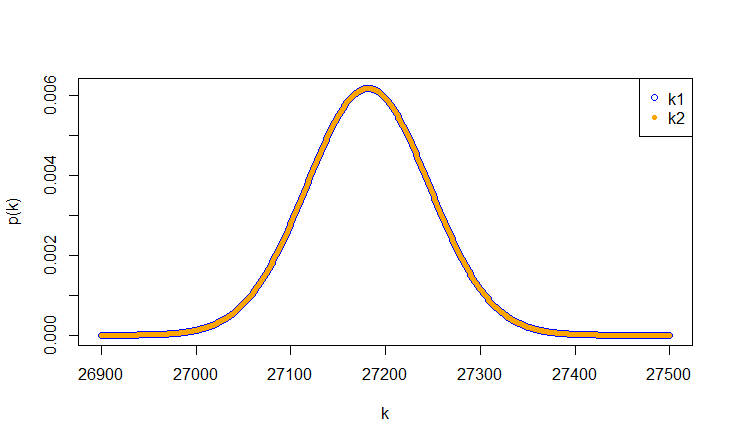This is related to the Coupon collector's problem as noted in the comments.
Building off of this post, the probability of observing $k$ unique letters in $m$ random samples from an alphabet of size $n$ is:
$\big\{\!{m\!\atop{k}}\big\}\binom{n}{k}\frac{k!}{n^m}=\big\{\!{m\!\atop{k}}\big\}\frac{n!}{n^m(n-k)!}$
Where $\big\{\!{m\!\atop{k}}\big\}$ is the Stirling number of the second kind.
For large $m$, $\ln\big(\big\{\!{m\!\atop{k}}\big\}\big)$ can be approximated.
Here is an R function that returns the probability of every $k$:
library(copula)
coupons1 <- function(n, m) {
l <- min(m, n)
k <- 1:l
if (m < 200) {
logS <- log(Stirling2.all(n)[k])
} else {
# estimate the log Stirling numbers
v <- n/k
G <- 1/v
vexpv <- v/exp(v)
for (i in 1:5) G <- G - (G - (vexpG <- vexpv*exp(G)))/(1 - vexpG) # Newton's method
if (l == n) G[l] <- 1
logS <- (log(v - 1) - log(v*(1 - G)))/2 + (n - k)*(log(v - 1) - log(v - G)) + n*log(k) - k*log(n) + k*(1 - G) + lgamma(n + 1) - lgamma(k + 1) - lgamma(n - k + 1)
}
exp(logS + lgamma(n + 1) - lgamma(n - k + 1) - m*log(n))
}
The probability of $k=1,2...43000$ for $n=m=43000$:
system.time(k1 <- coupons1(43e3, 43e3))
#> user system elapsed
#> 0.02 0.00 0.01
plot(26900:27500, k1[26900:27500], xlab = "k", ylab = "p(k)", col = "blue")
Comparing that result to a brute-force approach:
Rcpp::cppFunction("
NumericVector coupons2(const int& n, const int& m) {
int maxk;
int n1 = n - 1;
if (n > m) {
maxk = m;
} else {
maxk = n;
}
NumericVector k (maxk);
k(0) = 1;
for (int i = 1; i < maxk; i++) {
for (int j = i; j > 0; j--) {
k(j) = (k(j - 1)*(n - j) + k(j)*(j + 1))/n;
}
k(0) = k(0)/n;
}
for (int i = maxk; i < m; i++) {
for (int j = n1; j > 0; j--) {
k(j) = (k(j - 1)*(n - j) + k(j)*(j + 1))/n;
}
k(0) = k(0)/n;
}
return k;
}
")
system.time(k2 <- coupons2(43e3, 43e3))
#> user system elapsed
#> 12.29 0.00 12.31
The relative error from using the Stirling number approximation is small for a large $m$.
max(abs(k1[26900:27500] - k2[26900:27500])/k1[26900:27500])
#> [1] 8.288002e-07
points(26900:27500, k2[26900:27500], col = "orange", pch = 20)
legend("topright", legend = c("k1", "k2"), col = c("blue", "orange"), pch = c(1, 20))


